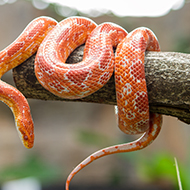Study identifies potential welfare concerns for pet snakes

The study found that snakes who were unable to stretch out fully had more clinical signs than those with enclosures longer than their body length.
A new study from the University of Bristol has identified many potential welfare concerns for pet snakes, following an owner questionnaire.
The study analysed data from 744 snake owners worldwide, investigating housing and husbandry practices and snake health and welfare using clinical signs and behavioural indicators.
Snakes have become ever more popular as exotic pets over the past few years, particularly in the UK, and thus it is important for UK owners to understand and provide the specific welfare needs required.
With the majority of respondents to the questionnaire residing in the UK (68.8 per cent), the findings suggest a need for accessible and evidence-based recommendations to owners on snake health, housing and husbandry.
Findings from the study showed that 54.7 per cent of snakes were kept in enclosures shorter in length or height than their body – which restricts snakes' ability to fully stretch out. In the UK specifically, researchers found that 10.2 per cent of snakes did not live in enclosures compliant with current recommended guidelines, which is an enclosure length of at least 0.66 times the snake's length.
Dr Nicola Rooney, corresponding author for the paper, said: "Our study has highlighted various concerns for snake welfare. The first of these relates to enclosure size, with snakes commonly being kept in vivaria preventing straight-line postures and movement.
“Snakes that were unable to stretch out fully had more clinical signs than those that were able to stretch out fully.”
Although the majority of snake owners (93.1 per cent) said that they measured the temperature in their snakes' enclosure, 24 per cent of these reported checking less than once per day, which is the recommended minimum.
Almost half (47.2 per cent) of commonly-owned snake species were found to be kept in sub-optimal temperatures for their species, while 48.1 per cent of owners did not measure the humidity of their snakes' enclosure.
"Whilst we did not find a significant association between temperature or humidity and measures of health and welfare in this study, it is a concern that many snakes were housed in conditions considered sub-optimal for their species,” said Dr Rooney.
“We know that appropriate temperature and humidity is vital for maintaining the health of snakes and it would therefore be prudent to investigate these associations further, using methods other than owner reporting."
Of the listed clinical signs, many owners reported their snake experiencing at least one, with skin shedding being the most common (28.2 per cent). After this, the signs reported were parasites (11.2 per cent), rostral cuts and scrapes (7.4 per cent) and respiratory problems (5.6 per cent).
Significantly, snakes kept in enclosures of less then one times their body length were found to have notably more clinical signs.
Other findings from the study focused on negative behaviours displayed by the snakes. These were interacting with transparent boundaries (52.8 per cent), wincing or withdrawal of head when gently touched (52.4 per cent), putting head under substrate (52.1 per cent), unusually high level of activity (51.1 per cent) and attempting to escape (45.9 per cent).
Researchers found that these negative behaviours – associated with captive stress – were far more likely to be reported in snakes with more clinical signs.
Editors-in-Chief of Animal Welfare, Dr Huw Golledge and Dr Birte Nielsen, added: "Until now, there has been little empirical data on the housing and husbandry practices of privately kept snakes, and how these impact on their welfare.
“As the first study of this size, this research provides valuable baseline data against which future surveys or welfare interventions can be compared.”
The study, funded by the Universities Federation for Animal Welfare (UFAW), is published in Animal Welfare. The full content is currently behind a paywall.



 The Animal and Plant Health Agency (APHA) has updated its online reporting service for dead wild birds.
The Animal and Plant Health Agency (APHA) has updated its online reporting service for dead wild birds.